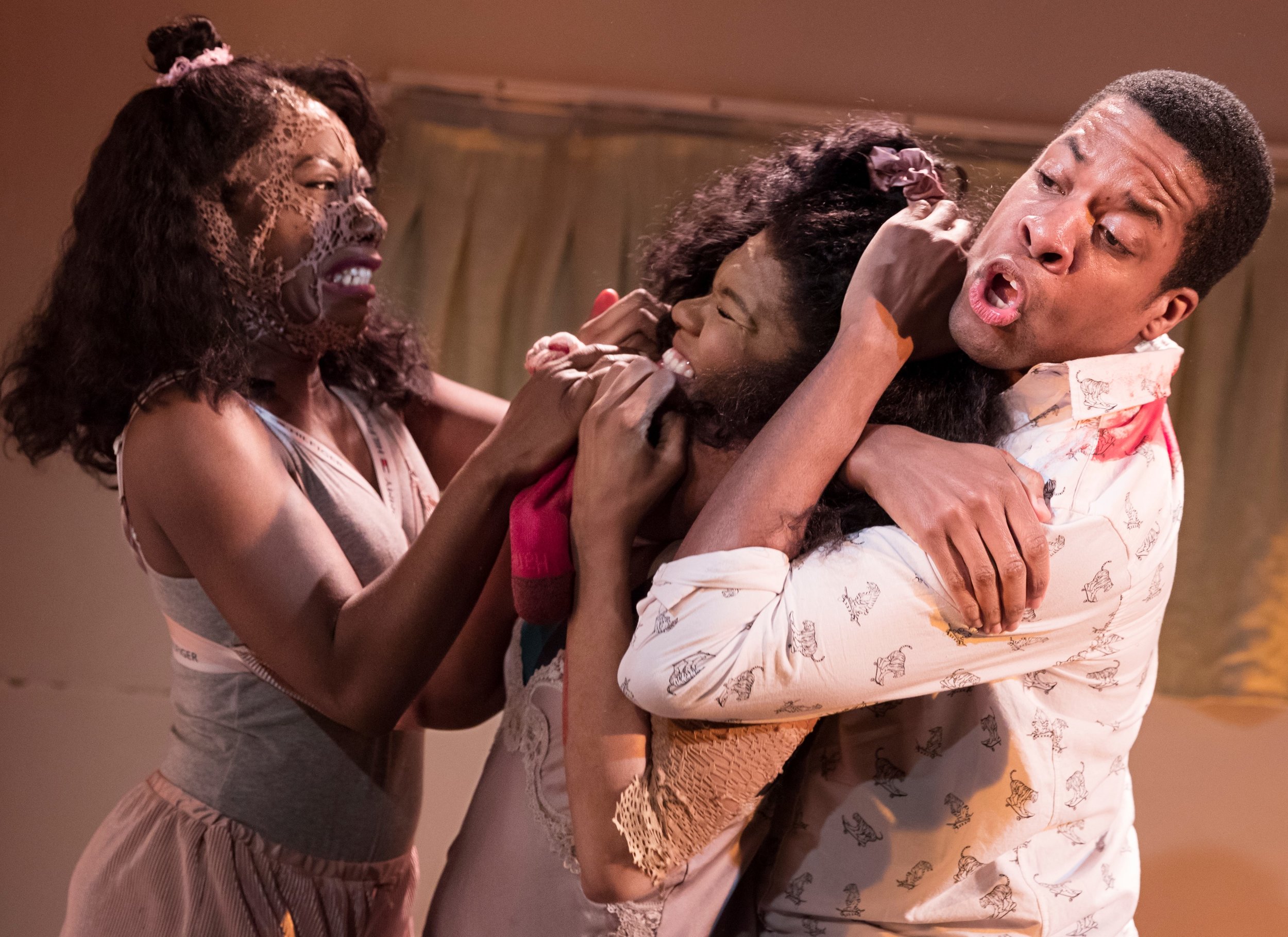The Soho Rep had been staging vital productions out of its small Walker Street theater in Tribeca for a quarter century when it was discovered, in 2016, that the company had been in violation of an occupancy limit of 70 people. Through a combination of fund-raising and city agency support, the company has now returned to its home space, which includes a new fire-safety system. It is a fitting improvement, because flames are the essential metaphor of Aleshea Harris’s explosive Is God Is. In this allegorical tale of vengeance and family honor, twin sisters, burned both literally and figuratively, create an inferno that swallows nearly everyone they meet.
Anaia (Alfie Fuller, left) and Racine (Dame-Jasmine Hughes) ready themselves for a road trip. Top: Sisters Anaia and Racine (Fuller and Hughes) struggle with stepbrother Riley (Anthony Cason).
Harris’s storyline is straightforward, but her influences and cultural shout-outs are full of curves, swerving from Greek tragedy to spaghetti Westerns to hip hop, and back again. What seems Shakespearean one moment can turn on a dime to feel more like a Quentin Tarantino rampage. Meanwhile, secret meanings and allusions ricochet across broken homes, amid suburban malaise, matriarchal power plays and desperate authority figures.
Anaia (Alfie Fuller) and Racine (Dame-Jasmine Hughes) are 21-year-old twins with a distinctive difference. Having been caught in a house fire when very young, Anaia’s face is heavily scarred, while Racine’s burns cover an arm and her back, which is to say that one sister can keep her rage hidden while the other cannot hide her damage. Their injuries are stylized with the marred skin resembling sponge, or perhaps ratty lace. Fuller and Hughes, as directed by Taibi Magar, are indeed sisterly, dynamically playing off each other with the kind of pacing that feels inbred. Their characters’ lives pivot when they discover that their mama (a powerfully calm Jessica Frances Duke), who they thought had perished in that house fire, is still alive, though just barely. Bedridden and nothing but a mass of scar tissue, she has been winding out her life at the wryly named Folsom Rest Home for the Weary, down in the “Dirty South.”
Setting the tragedy in full motion, the twins learn from their mother that the fire was started by their father (Teagle F. Bougere) in a homicidal rage, and it is her dying wish that the girls track him down and make him pay. “Dead, real dead. Lotsa blood is fine,” she instructs. The ensuing road trip to ruin leads the women out west, first to a brainless scarecrow in the guise of their former family lawyer, a pill-popping mess named Chuck (Russell G. Jones). Like almost all of the play’s characters, Chuck is looking for a way out, in this case an escape from his own guilty existence. He points the twins toward their father just before the drugs and liquor he has been gulping kick in. Racine makes sure he is dead by giving him a couple whacks with her weapon of choice, a rock in a sock that she wields like David on a killing spree of Goliaths.
Scotch (Caleb Eberhardt) fails to impress Racine (Hughes). Photographs by Julieta Cervantes.
Arriving at a suburban California home, the women meet, and have their way with, their father’s other family as well as the big man himself. There is his current wife, Angie (Nehassaiu deGannes), who has had it with both her husband and their useless twin sons, Scotch and Riley (Caleb Eberhardt and Anthony Cason). Suffice it to say that Racine’s sock gets quite the workout, even as the two boys display their carefree obsessions over arugula salads and poetry that “uses barbecue as a metaphor for love.” Neither actor is believably 16 years old, as the script dictates, but both provide some welcome comic relief in their cluelessness, and Cason has a show-stopping moment when his ready laugh turns to sobs of horror.
Given a stage with no room for stagehands, let alone fly space, how is it possible to handle the play’s myriad settings? Scenic designer Adam Rigg solves the problem with a pull-apart set that is as strange and violent as the characters themselves. Several scenes take place behind a long, narrow window where we observe the actors only from the waist up. At one point, the sisters actually pull the front half of the set away from the back, creating an upstage crevice for bodies to fall into. And, in the climactic showdown between father and daughters, the actors push down the rear wall, converting it into a ramp with a loud bang as unsettling as a gunshot.
Is God Is runs through March 31 at Soho Rep (46 Walker St., between Broadway and Church). Evening performances are at 7:30 p.m. Tuesday through Sunday; matinees are at 3 p.m. Saturday. For tickets, call OvationTix at (866) 811-4111 or visit sohorep.org/is-god-is. Rush tickets for sold out performances available 30 minutes before curtain.





